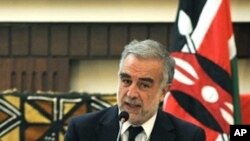On Wednesday, the International Criminal Court named six high-profile suspects it believes spearheaded the country's political chaos in 2007 and 2008. There is renewed hope for justice nearly three years later, but many, including some suspects, are surprised by the names included on the list.
ICC Prosecutor Luis Moreno-Ocampo released a list of suspects he believes are most responsible for the bloody aftermath of Kenya's December 2007 presidential election.
The list included familiar names, such as former Higher Education Minister William Ruto, who revealed himself to be a suspect in November after flying to The Hague to give a statement. Ruto is seen as the political leader of Kenya's Kalenjin ethnic group, as well as a dominant political figure in Kenya's Rift Valley, where much of the 2008 violence took place.
Also named was Industrialization Minister Henry Kosgey and Finance Minister Uhuru Kenyatta, son of Kenya's first president, who was pegged by many as a key player in the violence.
There was perhaps less speculation surrounding former police commissioner Mohammed Hussein Ali. The inclusion of journalist Joshua Sang came as a surprise to many. Sang is the director of Kass FM, a Rift Valley radio station which broadcasts to Kenya's Kalenjin ethnic community.
Perhaps the biggest surprise in the prosecutor's list was the head of Kenya's Civil Service, Francis Muthaura. Speaking to journalists shortly after being named, Muthaura maintained his innocence, but promised to cooperate with the ICC process.
"I thoroughly repudiate any suggestion that I have engaged in any activity that gives rise to responsibility under the Rome Statute of the International Criminal Court," Muthaura said. "In the event they do decide to issue a summons, I will voluntarily attend The Hague and respect any request the judges of the ICC have of me."
Muthaura was the subject of little speculation leading up to the prosecutor's announcement, and the former ambassador appeared shocked at being named. He told press that he had not received any communication from Prosecutor Moreno-Ocampo during the investigation. Months earlier, the prosecutor told media that all suspects under investigation had been contacted and invited to give statements at The Hague.
But many in Kenya believe the revelation of the suspects is the first step towards justice for the victims of the violence. A university student in Nairobi, Sally Rono, told VOA the ICC process would help end impunity in Kenya.
"I know Ocampo is not doing all this just to show us in the end there was nothing wrong with what they did," Rono said. "People got hurt. We are doing this so that we can show those big people - those people who were involved in this thing - we are not joking. We are so serious."
But there are those who feel the list did not go far enough. A Kenyan civil servant who asked to be identified as John doubted whether the six suspects carried out the chaos alone.
"If you check the list you can see as if it was Central and Rift Valley, which had the violence. There must be some names missing on that list," John said. "I do not think those six guys had the capacity to mobilize violence in Mombasa, violence in Kisumu, almost everywhere."
Prosecutor Moreno-Ocampo's list is only a request submitted to the International Criminal Court. Justices will decide in the coming days whether to issue summons for the six suspects to appear at The Hague.
President Kibaki welcomed Moreno-Ocampo's announcement, stressing the suspects were innocent until proven guilty. Kibaki said the current members of government would be allowed to keep their jobs during the ICC process.
William Ruto, Uhuru Kenyatta, Francis Muthaura and Henry Kosgey have promised to cooperate with the court.




